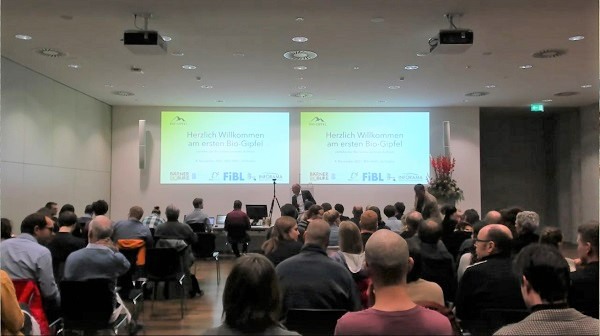On 04.11.2021, in Zollikofen, the Bern University of Applied Sciences for Agriculture, Forestry and Food (BFH-HAFL) invited all those who were interested to various lectures, discussions and workshops on the organic vegetable value chain. The event was moderated by Kevin Koch, director of Inforama, the education and training, consulting and conference center for agriculture, home economics, vegetable production and equine professions in the canton of Bern.

Supply and demand on the rise
A total of about 4 million francs was spent on organic vegetables last year, said Ilona Stoffel of Bio Suisse, product manager for vegetables, potatoes, herbs and ornamental plants. There was a 17.8% growth in organic vegetables compared to the previous year. Vegetables are the second most important category in Switzerland after milk, she said. Both demand and supply have grown, with about 20% of the vegetable area being farmed organically. Stoffel said: "40% of the organic vegetable assortment is made up of imported produce, to ensure the full range is available during the winter months."
spent on organic vegetables last year, said Ilona Stoffel of Bio Suisse, product manager for vegetables, potatoes, herbs and ornamental plants. There was a 17.8% growth in organic vegetables compared to the previous year. Vegetables are the second most important category in Switzerland after milk, she said. Both demand and supply have grown, with about 20% of the vegetable area being farmed organically. Stoffel said: "40% of the organic vegetable assortment is made up of imported produce, to ensure the full range is available during the winter months."
"Quantitative planning is necessary in organic cultivation"
David Schlup of Terraviva /  Mercato pointed out the challenges along the supply chain. He said that the largest sales of produce continue to be in the retail sector, but that a lot of small-scale produce remains. "The customer's wishes are our challenges. Our job as a producer organization is to get the most out of the commodity or the crop." Accordingly, he said, quantitative planning is needed, incorporating current trends as well as consumer demands in seasonal production planning.
Mercato pointed out the challenges along the supply chain. He said that the largest sales of produce continue to be in the retail sector, but that a lot of small-scale produce remains. "The customer's wishes are our challenges. Our job as a producer organization is to get the most out of the commodity or the crop." Accordingly, he said, quantitative planning is needed, incorporating current trends as well as consumer demands in seasonal production planning.
"Think globally, act regionally"
Since the organic  share is still quite low within the gastronomy sector and a lot of goods are still being thrown away, Mirko Buri and his team from Mein Küchenchef try to produce various products from surplus goods. Sauces, for example. "It's important not only to prevent food waste, but also to give people something to take away with them, in other words, we need to raise society's awareness of this issue," says Buri. "To make a difference, we need to think globally, but act regionally." That is why flexibility is needed on everyone's part, so that less products will be thrown away in the future.
share is still quite low within the gastronomy sector and a lot of goods are still being thrown away, Mirko Buri and his team from Mein Küchenchef try to produce various products from surplus goods. Sauces, for example. "It's important not only to prevent food waste, but also to give people something to take away with them, in other words, we need to raise society's awareness of this issue," says Buri. "To make a difference, we need to think globally, but act regionally." That is why flexibility is needed on everyone's part, so that less products will be thrown away in the future.
More conscious use of food
Stefan Stuchlik r epresented Slow Food Youth, a group of young people involved in the industry, whose long-term goal is to encourage young people to rethink their approach to food and food appreciation. He stated that a more conscious approach to food and nature is to be promoted through school projects, in order to raise awareness.
epresented Slow Food Youth, a group of young people involved in the industry, whose long-term goal is to encourage young people to rethink their approach to food and food appreciation. He stated that a more conscious approach to food and nature is to be promoted through school projects, in order to raise awareness.
For more information:
Bärner Bio Bure
Hof 697c
3454 Sumiswald
Event Bio-Gipfel
+41 (0) 34 461 82 73
info@bio-gipfel.ch
www.bio-gipfel.ch
